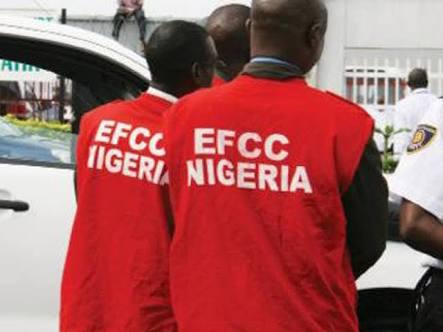The Economic and Financial Crimes Commission (EFCC) on Thursday denied knowledge of a letter allegedly written by former President Olusegun Obasanjo to ex-American President, George Bush, over a $1.7 million Potomac, Washington house which a former governor of Abia State, Orji Kalu, purchased in 2003.
The anti-graft agency disowned the said letter through one if its forensic investigators, Chidi Chukwuka, at the continued trial of the former governor over an alleged fraud of N2.9 billion.
According to Chukwuka the alleged letter between Obasanjo and Bush was none of the anti-graft agency’s business.
The EFCC is prosecuting Kalu, his Commissioner for Finance, Udeh Jones Udeogu, and his company, Slok Nigeria Limited on an amended 34 count charge of N3.2 billion fraud.
They were alleged to have used the following banks to perpetrate the alleged fraud, Manny Bank, Spring Bank Plc,( now Heritage Bank), the defunct Standard Trust Bank, now United Bank for Africa Plc (UBA) and Fin Land Bank, now First City Monument Bank (FCMB).
The accused persons pleaded not guilty to the charge.
The EFCC witness, who was being cross-examine by Kalu’s lawyer, Prof. Awa Kalu (SAN), also denied knowledge of the existence of any similar correspondence between Obasanjo and then Prime Minister of the United Kingdom, Tony Blair.
Responding, the investigator said, “My office is in the EFCC, not in the US.”
“You may not also be aware that Obasanjo was in correspondence with then UK Prime Minister, Tony Blair, with respect to some properties,” Kalu suggested to the witness.
“Not to my knowledge,” he replied.
Asked by the SAN whether the EFCC discovered in the course of its investigations that the former governor acquired a “family house” in Boston, Massachusetts, “as far back as 1997”, Chukwuka said he did not investigate the property.
“We are aware that the first defendant, by Nigerian standard, it is possible he has a house in the US but the house in the US was not subject to investigation; so, we did not pay attention to that,” he added.
“Did you find out that the area where that family house was located had racial issue on account of which he put it up for sale?” the lawyer asked the investigator.
“It was not part of our investigation,” he said.
The lawyer further suggested to the investigator that “as a result of the racial issue, the first defendant sold the the property for $3.8m in 2003,” to which, Chukwuka again replied that “it was not part of our investigation, sir.”
“Did your investigation show that the Potomac house was acquired with proceeds from the sale of the Boston property?” Kalu asked the investigator.
“We found an account where $1.7m was drawn and paid from a Nigerian bank,” the investigator said.
“Did you uncover an account from Nigeria or any part of Africa where $1.7m was drawn to pay for the property?” Kalu asked.
“It may interest you that the suspect was investigated that time and he had foreign accounts and funds were moved from Nigeria into those foreign accounts,” the investigator said.
“I suggest to you that the property in Potomac was funded from an offshore account in the US,” Kalu put to the investigator, who responded, “You are right.”
The trial judge, Justice Mohammed Idris has adjourned further proceedings in the matter till today, Friday.




